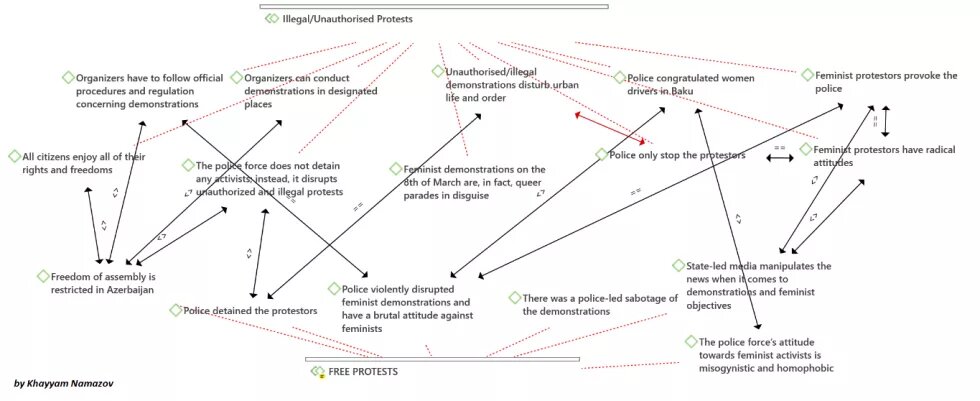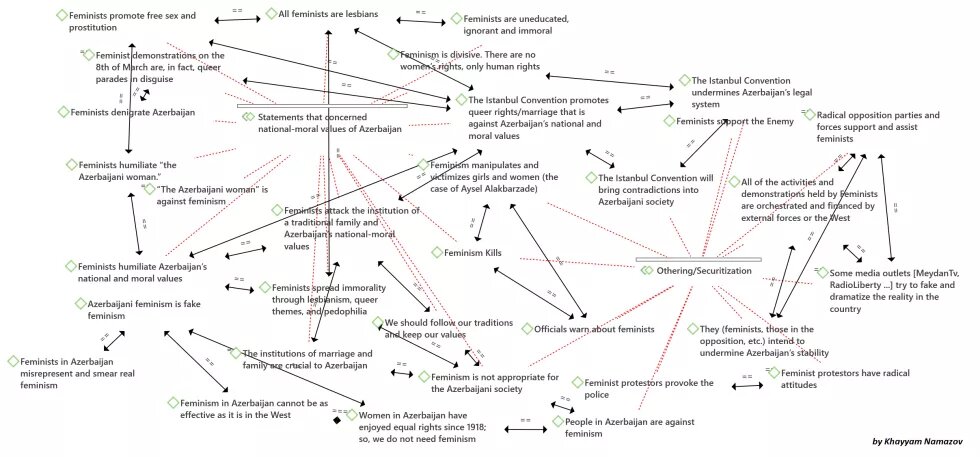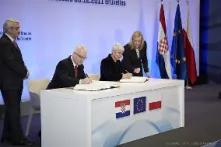
In Azerbaijan, antagonism and phobia against feminism have been so extensive that adopting a feminist identity and establishing feminist initiatives and organizations were incredibly slow-moving. As such, the first feminist groups of the new generation, who emerged during the late 2000s and 2010s, with their educational agenda, were initially situated in the "socio-cultural" space, constructed relatively "safe" in the autocratic rule. However, the situation changed when the women's marches of 2019-2021 mobilized the already forming feminist network, which meant crossing a "red line" in the highly paranoid and closed-off system. This article points out how the various consolidated apparatuses render feminism and feminists the most visible other by utilizing different othering techniques such as criminalization and securitization. What is more, it depicts how feminism and women's issues started to get politicized, shifting from the "social/safe" to the "political/dangerous" space on a discursive level.

The feminist identity has long been considered so problematic in Azerbaijan that those (cis)women who are active in politics (in both ruling and oppositional parties) and civil society, the NGO sector, and academia have avoided identifying themselves with the term. Feminists have been considered "crazy, irrational and unworthy of being taken seriously by others," while feminism is seen as a divisive force between men and women and a disruptive one when it comes to traditional gender norms and family structures (Walsh, 2020).
By 1998 there were more than 20 officially registered women-led NGOs in the country. Their work centered around the issues of poverty and unemployment, disability, health, children's rights, education, domestic violence, sex trafficking, female representation (Tohidi, 2000, 2004; Najafizadeh, 2003; Aliyeva, 2020). On the one hand, this movement relied on highly educated professional women from the Soviet era; on the other hand, it depended on governmental and international donor support, encouraging the organizers to maintain and diversify their activities and interests. Undeniably, the movement was also an urgent response to the caregiving, refugee, and humanitarian crises in Azerbaijan in the 1990s (Najafizadeh, 2003, 2018). By the time 2000s came around, there were 124 women's organizations and 69 NGOs in the directory of the national gender portal (www.gender-az.org). Yet, only two of the organizations included used "feminism" in their mission statements and descriptions (Aliyeva, 2020).
Besides, with the assistance of various embassies, international organizations, and donor foundations, several universities[1] began to teach gender studies and other related subjects. Academic curricula began to embrace theories of Western feminism while maintaining Soviet sex-role theory wherein difference is regarded biological and essential. Though it awoke the consciousness of some locals, the introduction of this field into Azerbaijani academia was also encountered with distrust[2] and skepticism[3], labeling feminism as seductive, intrusive and appropriating. Local scholars called for the development of “national gender studies” that would be guided by Azerbaijan’s “national mentality” (Aliyeva 2020). Consequently, in the time period, most of the women who were active in civil society, as well as female scholars and educators, identified themselves as women’s rights defenders or gender experts, also termed as “genderologist” in order to keep away from Western feminist ideologies and eschew the feminist identity (Aliyeva 2020).
Early Feminist Groups in Safe Socio-Cultural Spaces
The feminist label came into relatively wider use in private and public life in the 2010s. These feminist women belonged to a new generation of activists, born in the 1980s and 1990s and brought up in an independent Azerbaijan. They also largely came from well-educated middle-class families, spoke several languages, had easy access to the internet, and were more receptive to “Western values” (Aliyeva 2020, pp. 240-241). Some feminist women of the time took on the slogan of “Yes, I am a feminist – I am a bad girl,” as a protest against such branding of the identity (Walsh 2020). In general, the 2010s can be designated as a period during which the initial network of self-proclaimed feminists, including some small youth groups, communities, and individuals started to grow. Of course, many others took on feminist values without using the label (Walsh 2020).
The early 2010s saw protests against the Azerbaijani government, political repression of oppositional forces, various amendments to NGO legislation (Namazov, 2018b), and a range of criminal cases brought up against local and foreign NGOs (Ismayil and Remezaite, 2016). It seemed as though the sector[4] was being shut down by the government, leading to the topics of democracy and human rights becoming taboo. Instead, other issues such as women’s and queer rights, considered safer and less political, came to the forefront. The already developing feminist discourse and identity began to be proliferated through social media and was bravely adopted[5] by the new generation of activists.
Although there was a range of organizations in the 2010s where members identified themselves as feminists, none were considered "political."[6] Without exception, "Azerbaijan Feminist Group”[7] within YUVA Center (2006), "Feminist Women's Movement"[8] (2012), MIL Network's[9] (2014) gender education programs on feminism and queer rights, "Equals"[10] (2016), "FEMM Project"[11] (2016), and a feminist portal, "Qadınkimi.com" (2018), all distanced themselves from political discourse and activism. Most of the projects and events that were conducted followed the enlightenment strategy[12], thereby were considered mainly “sacio-cultural”[13]; that is, relatively safe in this highly dangerous socio-political environment. Their discourse on feminism[14] during these years was mainly aimed at raising awareness on gender issues, expanding public space for debates, and changing the negative perception of feminism in local society. With their educational means, these feminist activist women fought against everyday sexism, patriarchy, the institution of virginity, and male domination in families. Moreover, the rise of feminism was predominantly connected to urban life and feminist groups were a signifier of social transformation in cities (Aliyeva 2020, p. 236-244).
Feminism Is Becoming Politicized
These diverging frameworks surrounding activist spaces - genderologist and social feminist stances - were profoundly disturbed by the women's marches held in 2019-2021. The first demonstration, "March 8 - GO against Violence," was arranged in 2019 by the Feminist Women's Initiative Group. The march aimed at "restoring the original meaning to this historical day [March 8]," a statement often circulated in the sector.[15] Importantly, the march called women to unite in order to free society from patriarchy, make their voice heard, emancipate from male hegemony, and protect themselves from domestic and other types of violence, including femicide. The first march and following demonstrations were brutally disrupted by police forces and, in some cases, with the help of a sabotage group, a familiar means of breaking up protests in Azerbaijan.
This article is based on a study in which I analyzed more than 230 news articles, reports, opinion pieces, and other types of media concerning the women’s marches shown in Table 1, written in Azerbaijani and collected from 21 online local media outlets. These demonstrations and the discourses surrounding them have not merely politicized feminist identity; they also restructured the spaces in civil society that deal with women’s issues. In short, after the women’s marches, feminism started to shift gradually from the sphere of the “social/safe” into that of the “political/dangerous”.[16]
Table 1. Feminist women’s marches during 2019-2021
Marches |
Organizers |
Objectives/Demands |
Slogans |
|
|---|---|---|---|---|
|
“March 8 - GO against Violence” on March 8, 2019 |
Feminist Women’s Initiative Group |
Restore the original meaning to this historical day, free Azerbaijani society from patriarchy, make women’s voices heard, emancipate women from male hegemony, bring all types of violence against women into the limelight.. |
“End Violence against Women!” |
|
|
“Do not Endure, March!” on October 20, 2019 |
A group of feminist women |
Unite for the women who are denied an education, forced to marry, and driven to suicide, demand improvements in law enforcement, legislation, and bureaucracy for better protection of women, Join the Istanbul Convention. |
"Do not refuse the [Istanbul] Convention, do not kill women”; “Do not be silent against violence, do not tolerate violence”; “Murders of women are political”; “Sweeper women should not die”; “End early [child] marriage”; “It is not a family issue”; “Do not be silent for Elina.” |
|
|
“March 8 - The Streets Are Free for Us” on March 8, 2020 |
Azerbaijani Feminist Movement |
Demand that, regardless of gender identity and sexual orientation, all individuals be given freedom and security, employment and education, join the Istanbul Convention. |
|
|
|
“March 8 - For Our Rights” |
A group of feminist women |
Pressure the government to join the Istanbul Convention, demand that the State admit its responsibilities in cases of femicide and violence against women, demand that the restrictions placed on women’s rights activists be removed. |
"Fight as a woman, destroy as a woman, create as a woman!" |
To organize a public demonstration without the permission of authorities, even against their will, and to attempt to mobilize people or a particular community means crossing one of “the red lines” of the highly paranoid and closed-off Azerbaijani political system (Namazov, 2018c). Moreover, in Azerbaijan, there was already a dispositif[17] that had been growing stronger in the previous decades, created at the intersection of a range of socio-political discourses and knowledge(s) generated by particular power centers, legislations, state and social institutions, media outlets, and law enforcement agencies that guard “the red line” – a boundary between the social and the political, the “safe” and the “dangerous”. The apparatus deactivates any threatening groups by othering through criminalization, securitization, marginalization at the discursive level, and additional oppressive and repressive practices. This apparatus functions as a detecting mechanism that renders rule-breakers visible and introduces their souls and bodies to other interrelated dispositifs, controlling and keeping them “within discourse.” As such, after the women’s marches, feminism and feminists found themselves cut by different knowledge(s) generated by these apparatuses.
Figure 1. A field of statements concerning the feminist marches (2019-2021)
"Free Protest" and the fundamental statements within it are mainly generated by feminists and other activists, intellectuals/writers, several online media outlets (such as Radio Liberty, Meydan TV, BBC Azeri, Toplum TV, MikroskopMedia, etc.) that are considered as independent and include writers and intellectuals, some international watchdog organizations, and institutions such as Amnesty International, HRW, Freedom House.
As displayed in figure 1, at the very outset of the process, the feminist marches were made illegal through the dispositif, which has long been used against oppositional forces. Figure 2 further exemplifies how feminists were criminalized, securitized through different types of othering,[19] and positioned as fake, immoral, perverts (in regards to LGBTQI+ issues), lesbians, traitors, puppets of “The West,” dangerous, manipulated and manipulative, anti-man, anti-family, and anti-nation. It is noteworthy that unlike the genderologists and some of the social feminists, organizers and participants of the feminist marches fight against the conventional gender binary system, promote queer rights publicly, and collaborate with local LGBTQI+ organizations. During the third march held on 8 March 2020, the marchers publicly referred to gender identity and sexual orientation, an unfamiliar act in Azerbaijani street demonstrations. As such, the figure of the immoral feminist, connected to queer issues and free sex was constructed as the biggest threat against Azerbaijani family and the country’s national and moral values.
Figure 2. A collection of statements on “feminists/feminism” in Azerbaijan (2019-2021)
Thus “feminists/feminism” became the farthest other and the most visible at the same time. Local power relations rendered them the most hated, a group that received critique from almost all active segments of society, including those in the opposition and academia who were regarded as independent. Consequently, this process - women’s marches and discourses surrounding them - has greatly influenced both women’s activism and general politics. If, previously, the discourse related to women’s issues circulated around genderologist and the social feminist frameworks as a relatively “safe” topic, as a result of political feminists’ activities, women’s issues started to be politicized, that is, shifted into the space of “political-dangerous”. In this sense, we will likely see more conflicts of interest in the future. In addition, the process has extended the already existent structure of power relations that forces socio-political actors to pursue “political correctness.” Either way, at the conjunction of these discourses, women’s marches and the emerging feminist movement have opened up a new political space that continues to reconstruct civil society and politics in Azerbaijan.
The content of this article is the sole responsibility of the author and can in no way be taken to reflect the views of the Heinrich Boell Foundation Tbilisi Office- South Caucasus Region.
This article was first published on Heinrich Böll Stiftung South Caucasus: https://feminism-boell.org/en/2021/10/25/emerging-political-feminism-az…;
Bibliography:
Aliyeva, Y. G. (2020) ‘Exploring Two Generations of Women Activists in Azerbaijan: Between Feminism and a Post-Soviet Locality’, in Ziemer, U. (ed.) Women’s Everyday Lives in War and Peace in the South Caucasus. Cham: Palgrave Macmillan, pp. 225–252. Available at: https://doi.org/10.1007/978-3-030-25517-6_10.
Foucault, M. (1980) ‘The Confession of the Flesh’, in Gordon, C. (ed.) Power/Knowledge: Selected Interviews and Other Writings 1972-1977. New York: Pantheon Books, pp. 194–228.
Ismayil, Z. and Remezaite, R. (2016) Shrinking Space for Civil Society in Azerbaijan: Tackling Restrictive Laws, Criminal Prosecutions, Tax Penalties. International Report. Caucasian Initiative Center. Available at: http://openazerbaijan.org/site/assets/files/1081/shrinking_space_for_ci… (Accessed: 19 July 2021).
Najafizadeh, M. (2003) ‘Women’s Empowering Carework in Post-Soviet Azerbaijan’, Gender and Society, 17(2), pp. 293–304.
Najafizadeh, M. (2018) ‘Women in Azerbaijan: Decades of Change and Challenges’, in Najafizadeh, M. and Lindsey, L. (eds) Women of Asia: Globalization, Development, and Gender Equity. New York: Routledge (Area Studies, Development Studies, Social Sciences), pp. 349–364. Available at: https://www.taylorfrancis.com/books/e/9781315458458/chapters/10.4324/97… (Accessed: 14 April 2020).
Namazov, K. (2018a) ‘Aktivizm Maarifçiliyə Qarşı [Activism against Enlightenment]’, Open Azerbaijan. Available at: http://openazerbaijan.org/blog/aktivizm-maarifciliy-qar/ (Accessed: 12 July 2021).
Namazov, K. (2018b) ‘Civil Society Policy in Azerbaijan: Understanding the Shifting Borders of the Space for Civil Society within NGO Legislation’, Study Series on Public Policy Issues, pp. 216–227.
Namazov, K. (2018c) ‘Сurse of a Closed System: Waiting for Serendipitous Change’, Open Azerbaijan. Available at: http://openazerbaijan.org/en/topics/analytics/curse-of-a-closed-system-… (Accessed: 20 July 2021).
Tohidi, N. (2000) ‘Gender and National Identity in Post-Soviet Azerbaijan: A Regional Perspective’, in Acar, F. and Günes-Ayate, A. (eds) Gender and Identity Construction: Women of Central Asia, the Caucasus and Turkey. Brill (Social, Economic and Political Studies of the Middle East and Asia), pp. 249–292.
Tohidi, N. (2004) ‘Women, Civil Society, and NGOs in Post-Soviet Azerbaijan’, The International Journal of Not-for-Profit Law, 7(1). Available at: https://www.icnl.org/resources/research/ijnl/women-civil-society-and-ng… (Accessed: 8 April 2020).
Walsh, S. (2020) ‘Feminism in Azerbaijan: Gender, Community and Nation-Building’, in Ziemer, U. (ed.) Women’s Everyday Lives in War and Peace in the South Caucasus. Cham: Palgrave Macmillan, pp. 253–275. Available at: https://doi.org/10.1007/978-3-030-25517-6_11.
[1] Aliyeva (2020) lists the following institutions and universities in which gender studies were first thought: The Academy of Public Administration, Western University, Baku State University, Khazar University, Baku Slavic University, State Pedagogical University (named after N. Tusi), and Odlar Yurdu University.
[2] Although it is beyond the scope of this article, it is noteworthy that this repercussion can also be seen through the lens of post-colonial studies where Western feminism, feminists, and women are critiqued as those central to knowledge production and dissemination. They find the “non-Western” women as “non-feminist others” (Aliyeva 2020) and objects/targets of their knowledge.
[3] Aliyeva (2020) explains this backlash in academia. First, these women activists complained about “the cognitive dissonance” of feminist scholarship and found it abstract and detached from the realities of Azerbaijan. Therefore, they tended to adopt the gender binary system and operate within it. Second, the time when feminist ideas began to diffuse into Azerbaijani society coincided with the “crisis of masculinity” due to high unemployment and economic hardship that undermined the dominant breadwinner role of men in the family. As such, feminist critique of patriarchy and male dominance tended to be conceived as another threat against men. Third, the gender experts were relatively isolated from global feminist trends because of scant international conferences and training projects, scarce feminist literature, and limited knowledge of foreign languages (pp. 233-236).
[4] The sector, that is, the public sector in Azerbaijan, is/was used as a term for the activist, critical, anti-governmental, and pro-democratic part/space of civil society that includes a range of NGOs that are mainly concerned with democracy and human rights, connected to youth groups, activists, social workers, intellectuals, writers, and independent journalists.
[5] To have a clearer picture of the ramifications of feminist discourse in Azerbaijan in the 2010s, more rigorous research and discourse analysis are needed. Here, I do not claim a causal relationship between the shrinking of civil society and the proliferation of feminist discourse.
[6] Here, I utilize the notion of the "political" with the local understanding in order to designate the border between the "social/cultural" and the "political," which overlaps with the boundary between the "safe" and the "dangerous."
[7] For further information about the activities of the feminist group, see https://yuvacenter.wordpress.com/
[8] The organization was established by a group of lawyers as an NGO. Its activities were not visible enough in public and its Facebook page was active only in 2012-2013.
[9] MIL Network has conducted its civic education programing and training concerning feminism, women issues, LGBTQI+, and other gender-related topics under the project of "MIL Gender" since 2014. For further information, see https://milnetwork.org/
[10] "Equals" aims to "advance the debate over gender equality in Azerbaijan" and mainly organizes movie nights featuring documentary and feature films about gender equality.
[11] FEMM Project has a mission of helping others "to understand the real meaning of the word feminism." The organization films documentaries, and conducts interviews regarding gender-based discrimination and traditional attitudes to women. Although they identify themselves as feminists publicly, they are not attached to any particular wave of feminism (Aliyeva 2020, pp. 237-238).
[12] In the article "Activism against Enlightenment" (Namazov, 2018a), I designate two discursive strategies of the public sector between 2011 and 2013. If those who supported “activism” promoted organization, mobilization, and a non-violent struggle against the autocratic regime, the supporters of the "Enlightenment" promoted civic education and its different forms as the primary means to achieving fundamental societal change. This classification also coincides with the social-political and safe-dangerous divisions.
[13] Gender-based violence, gender inequality and discrimination, education of young girls, women's empowerment, women's participation, critique of the traditional understanding of family structures and values are the primary topics these organizations have focused on.
[14] Aliyeva (2020) identifies the new generation, using "Equals" (2016) and "FEMM Project" (2016) as examples, as “local signifiers for the emerging fourth-wave feminism,” seeing as their activism is so similar to that of organizations in other countries..
[15] 8 March – International Women’s Day is celebrated in Azerbaijan as a public holiday during which men usually buy gifts such as flowers, toys, and perfume for women. This tradition, including the types of presents and the lack of any women’s movements and demonstrations, has long been criticized by some intellectuals and writers in the sector.
[16] During this period, three feminist organizations/initiatives - Femiskop, FemKulis, and Fem-Utopia - were established.
[17] Here, I use Michel Foucault’s concept of the dispositif to mean a “heterogeneous ensemble consisting of discourses, institutions, architectural forms, regulatory decisions, laws, administrative measures, scientific statements, philosophical, moral and philanthropic propositions - in short, the said as much as the unsaid” which is inscribed in the play of power (Foucault, 1980, p. 194)
[18] It is noteworthy that the othering process was intensified after the women’s march on 8 March 2020 by a participant raising a poster with the slogan - “The girl is mine. I can do whatever I want with her. My vagina is mine. I can give it to whomever I want.” The pro-government media framed only the second part of the slogan and generated out of it the idea of an “immoral feminist” who promotes free sex and prostitution. Two days later, after the same participant committing suicide, law enforcement agencies criminalized the process and took on a new position – calling the marcher “the victim of feminism.” As such, “feminism kills” and similar statements are directly related to the event and its interpretations.



